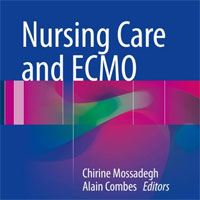Tag: ICU

ICU Costs Higher for Patients Dying Before Discharge
The high cost of critical care has engendered research into identifying influential factors. However, previous studies have not considered patient vital status at ICU discharge. This is what a new study has found: The largest... read more

A Nurse’s Story
The team of nurses that Tilda Shalof found herself working with in the intensive care unit (ICU) of a big-city hospital was known as "Laura's Line." They were a bit wild: smart, funny, disrespectful of authority, but also... read more

Thromboelastography-based Anticoagulation Management During ECMO
Thromboelastography (TEG) seems to be safely used to guide anticoagulation management during ECMO. Its use was associated with the administration of lower heparin doses compared to a standard of care aPTT-based protocol.... read more

Interventions to Improve the Physical Function of ICU Survivors
ICU admissions are ever increasing across the United States. Following critical illness, physical functioning (PF) may be impaired for up to 5 years. We performed a systematic review of randomized controlled trials evaluating... read more

The Shocked Intubation: Definitive Airway Sans Hypotension
Not many aspects of Emergency Medicine define our specialty better than resuscitation, and few concepts exemplify resuscitation better than shock and intubation. Yet few words together strike greater fear in the minds of... read more

Top 10 Tips for New Interns to Survive and Thrive the ICU Rotation
Graduating residents moving on and new interns, fresh out of medical school with their clean and crisp long white coats, moving in. Out with the old, in with the new! The ICU rotation for medicine residents and medical students... read more
What’s the Bleeding Problem with Trauma Laparotomies?!
Mortality for hypotensive trauma patients undergoing emergency laparotomy have not changed in 20 years. This blog explores the literature and the future! Wait! We're emergency physicians, why do we care about laparotomies?!... read more

Short People Have Higher Risk Of Dying In The ICU
Researchers of a new study have found a link between a patient's height and odds of survival in the intensive care unit (ICU) of the hospital. The study, published in the journal Intensive Care Medicine on Dec. 23, show that... read more

A Familiar Story: Delirium in the Acute Care Setting
A few years ago, I received report that a patient was ready to be weaned from the ventilator. He had no respiratory need for mechanical ventilation, and every time the medical team attempted to wean sedation to extubate,... read more

Healthcare Providers Should Be Ready for Nerve Agent Attacks
Recent attacks in the UK and elsewhere using powerful nerve agents show that U.S. healthcare providers don't need to be near a battlefield to find themselves dealing with similar emergencies, researchers argue in a commentary... read more

Tigecycline in Critically Ill Patients on Continuous RRT
Despite high dialysability, dialysis clearance displayed only a minor contribution to tigecycline elimination, being in the range of renal elimination in patients without AKI. No dose adjustment of tigecycline seems necessary... read more

Antimicrobial Exposure and the Risk of Delirium in Critically Ill Patients
First-, second-, and third-generation cephalosporins doubled the odds of delirium after baseline co-morbidities, ICU type, the course of critical care, and other competing antimicrobial and psychotropic medication risks were... read more

Crystalloids vs. Colloids for Fluid Resuscitation in the ICU
This systematic review and meta-analysis, which included only high-level evidence from randomized, controlled trials (RCTs) conducted in intensive care settings, revealed that crystalloids were less effective than colloids... read more

Risk Factors for 1-Year Mortality and Hospital Utilization Patterns in Critical Care Survivors
One in five ICU survivors die within 1 year, with advanced age and comorbidity being significant predictors of outcome, leading to high resource use. Care process factors indicating high system stress were associated with... read more








